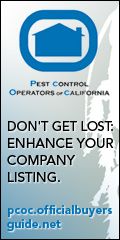News Briefs
Pest Control Operators of California
October 2010
What won't change, however, are the congressional incumbent office holders in California, Democrats and Republicans. As a result, these folks are immune to political trends, both federal and state.
Fact: Just one of California's 53 congressional districts has changed partisan hands since the districts were last redrawn by the Legislature after the 2000 census.
National polls indicate that another congressional shift is looming, with the possibility of the Republicans re-taking the House. This is certainly stunning news ... except for Californians! Those gerrymandered Congressional districts here in our golden state mean that only a few California seats, at most, could change hands this year.
Whether California remains a backwater for Congressional battles up in the air, on Nov. 2, Proposition 20 on the statewide initiative ballot would put congressional redistricting in the hands of an independent commission in order to redraw districts ... which might prevent future gerrymandering.
Oh, I forgot to mention that Proposition 27, on our same ballot, would abolish the redistricting commission and put all redistricting back in the hands of the California Legislature.
Which are you going to vote for?!
CALIFORNIA AERATION PLAN (CAP)
The new fumigation aeration procedures (CAP) take effect on Nov. 1, 2010. Our PCOC Fumigation Enforcement Committee has done an excellent job getting the word out on the new CAP procedures. One item of concern is SPCB Act section 1970.5, which deals with how long a licensee remains on the job site once aeration begins. DPR is aware of the problem, is currently reviewing enforcement of this regulation and should provide a solution in the near future.
DO YOU TRUST YOUR EMPLOYEES???????????
If the answer is no, why are you letting them take care of your customers? Your front-line employees often provide the first impression a prospective customer has with your company. Are you sure you can trust them to make a good impression? If you don't trust them, you probably can't.
A lack of trust usually means that they probably shouldn't be relied upon to interact with your customers. Can you really trust that they'll do the right thing when it comes to taking care of them? If you don't trust your employees, do you really think your customers are going to?
Trust is the foundation for effective communication, employee retention and employee motivation. If you, as owners and managers of the business, are able to build this type of culture within your organization, you will reap the rewards. Employees who feel respected and trusted, and who are treated like adults, will act like adults. Employees will be more productive and enjoy coming to work, and be ambassadors for your brand and your organization.
If you empower your employees, they might surprise you with the way they do their job. They will be inspired to take better care of your customers. Unless employees are trusted with decision making, they won't make a decision. Provide employees with a vision and set of principles and then empower them to make decisions. Give them the freedom to make mistakes and learn from them.
Trust is a two-way street. Do your employees trust you? Mutual trust will create an environment that customers will flock to. If you don't have trust, you may not have customers.
PEST ED 2011
PCOC and Univar are presenting PEST ED again, in January of 2011. Mark your calendars now with the dates and locations: Jan. 11, 2011, in Montebello; and Jan. 12, 2011, in Sacramento. Jeff Tucker from BASF will be the featured speaker at both locations.
My company has been a member of both PCOC and NPMA for over 35 years. There are definite advantages to joining both organizations, and all members have benefited greatly from both associations.
We currently have the opportunity to join both associations at a greatly reduced price, which is cheap by any measure! A smaller company of five or less employees would only cost an additional $65.00 per year, a savings of over $400.00 off regular NPMA dues! Similar savings occur for all the other dues categories.
This is an "All or Nothing" proposal, and requires your board of directors' approval; otherwise we will not be afforded this opportunity. I urge you to support this great opportunity, and let your local district president and board know you want a national voice as well as a state voice.
Here are some of the benefits of a national association membership:
1. A national legislative and regulatory voice. We work with the EPA, FDA, and many regulators, as well as our legislative advocacy and national legislative day.
2. Full member access to NPMA forms and training materials online, as well as NPMA field guides and other reference guides.
3. Promotional and marketing materials.
4. Technical resources for pest information and many business and compliance items.
5. Regional Educational Conferences and management training.
6. Webinars for quick updates and policy discussions.
7. "Quality Pro" and "Quality Pro Green" certifications.
8. And best of all, the PestWorld convention and trade show. If you have never been to one, make sure to plan to attend. The exhibits and training are incredible. I have attended every convention for about 30 years, and learn a lot every time!
Don't let this opportunity get away! Help us get the most for your association dollar.
For the Joint Membership Task Force of PCOC,
Dennis Merrill, Killroy Pest Control, Campbell
Visit http://www.naylornetwork.com/cpc-nwl/assets/endorsed%20programs2.pdf to view the full article online.
The typical U.S. worker spends up to 90 percent of his or her time indoors, making exposure to indoor pollutants a growing problem.
The World Health Organization has estimated that as many as 30 percent of new and remodeled buildings worldwide contain enough pollutants to make workers ill.
What kinds of contaminants can you find indoors? Specific pollutants include:
• chemicals off-gassed from materials in the office, such as new carpet, paint, toners and inks
• fumes from cleaning compounds
• excessive dust
• microbial contamination, such as molds and other microbes growing in the HVAC (heating, ventilation and air conditioning) systems
• radon gas
• carbon monoxide, caused by combustion in an area with insufficient ventilation.
Exposure to off-gassed chemicals and fumes can cause a variety of symptoms, depending on the type of chemical, concentration and duration of exposure. Exposure to molds and other microbes can cause hypersensitivity pneumonitis, rhinitis, sinusitis, asthma and Legionnaire's disease. Radon gas, a substance that occurs naturally as uranium in rock and soil decays, can seep from the ground into buildings. Breathing radioactive isotopes could cause lung damage and cancer. Carbon monoxide poisoning can cause dizziness, fatigue, nausea, unconsciousness and even death.
Improving indoor air quality and reducing or eliminating your employees' exposure to these dangerous substances, take two steps: source reduction and improved ventilation.
Source reduction requires finding sources of indoor pollution and eliminating, reducing or containing them. Steps you can take include:
• banning smoking indoors or near entrances (if your state or municipality doesn't already ban smoking in the workplace).
• disposing of trash and garbage promptly and properly.
• working with your building manager to reduce or eliminate use of chemical pesticides and herbicides inside and outside the building.
• selecting furnishings and finishes with minimal or no off-gassing. Common off-gassing culprits include carpeting, furniture and items made with particleboard or other composite materials, paints and varnishes.
• having cleaning services use nontoxic cleaning supplies.
• reducing radon exposure, which varies with the geography of your area, by installing vapor barriers.
• checking sources of combustion, such as furnaces, stoves and heaters for release of carbon monoxide. Many municipalities require buildings to have carbon monoxide alarms in addition to smoke alarms. As CO is colorless and odorless, a monitor or alarm can save lives.
• checking office supplies for toxicity and fumes. Glues, solvents, toners and other common substances can release harmful fumes into the air. You can find substitutes, minimize their use or make sure workers using these substances do so in a well-ventilated area, with eye and nose protection, if necessary.
Improving ventilation. In modern office buildings with sealed windows, indoor air quality depends on your HVAC system. To provide optimum ventilation:
-
Do not block vents.
-
Have an HVAC professional evaluate your system for airflow, filtration and dampness. Dampness in the ducts can allow the growth of mold, which can trigger allergies.
-
Pay attention if more than one worker complains of eye, nose and/or throat irritation; coughs; headaches; fatigue; nausea or muscle pain – particularly if those symptoms disappear or improve when they leave the office. These symptoms could indicate an indoor air quality problem.
For more information on dealing with indoor air quality and other workplace health and safety issues, please contact the PCOC Insurance Program Department at Jenkins Insurance Group: (877) 860-7378.
TEMPORARY NPMA LOGIN FOR JOINT MEMBERSHIP
LOGIN: 313501
PASSWORD: PCOC
PCOC Web site password for 2010-2011: "termite"
Please remember, the password changes every July 1!
Department of Fish & Game
www.dfg.ca.gov
Department of Food & Agriculture
www.cdfa.ca.gov
Department of Pesticide Regulation
www.cdpr.ca.gov
Find Your Legislator
www.leginfo.ca.gov/yourleg.html
Healthy Schools Act
www.schoolipm.info
Structural Pest Control Board
www.pestboard.ca.gov



